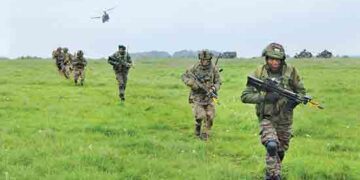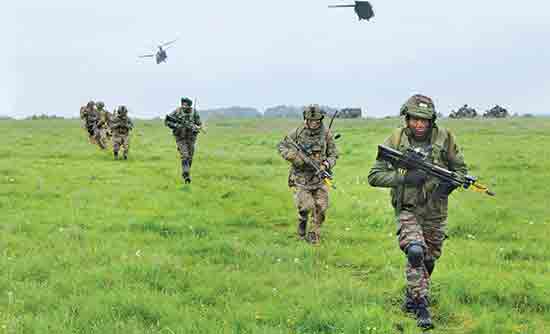 NEW DELHI/LONDON: The seventh edition of the joint India-United Kingdom military exercise ‘Ajeya Warrior-23’ is being conducted at the Salisbury Plains in the southern parts of England. The two-week-long operation is scheduled to end on May 11.
NEW DELHI/LONDON: The seventh edition of the joint India-United Kingdom military exercise ‘Ajeya Warrior-23’ is being conducted at the Salisbury Plains in the southern parts of England. The two-week-long operation is scheduled to end on May 11.
Ajeya Warrior is a biennial joint training which is conducted alternatively in the UK and India, the last edition of which was held at Chaubatia in Uttarakhand in October 2021.
The aim of the exercise is to build positive military relations, imbibe each other’s best practices and promote the ability to operate together while undertaking companylevel sub-conventional operations in urban and semiurban environments under the UN mandate. In addition, it is intended to develop interoperability, bonhomie, camaraderie, and friendship between the two armies.
Soldiers of UK’s 2 Royal Gorkha Rifles and Indian Army soldiers from the Bihar Regiment are participating in the current exercise. The Indian Army contingent arrived at Brize Norton on April 26 in an Indian Air Force C-17 aircraft with indigenous weapons and equipment.
Scope of exercise
The scope of this exercise involves a Command Post Exercise (CPX) at the Battalion level and Company level Field Training Exercise (FTX). During the exercise, participants will engage in a variety of missions testing their operational acumen in various simulated situations, showcasing and refining their tactical drills and learning from each other’s operational experience.
In a statement from India’s Ministry of Defence, exercise Ajeya Warrior was hailed as yet another significant milestone in defence cooperation between the Indian Army and British Army which will further foster the bilateral relations between the two nations.
The UK has hailed India as a natural partner in defence, saying it shares a strong and enduring relationship, including collaboration in research, development, and training. “India is a valued defence partner for the UK and our relationship continues to flourish across our research and industrial sectors,” said Defence Secretary Ben Wallace.
“Both our nations are committed to the stability and prosperity of the Indo-Pacific and we continue to train and operate alongside our Indian partners to promote security in the region,” he stated.
CDS visit to India
The statement came following UK’s Chief of the Defence Staff Admiral Sir Tony Radakin’s three-day India-visit in midApril. He held a series of highlevel meetings during his visit, “strengthening the strategic ties between both countries”.
The visit provided an opportunity to boost militaryto-military engagement and explore opportunities around the co-creation of future technologies.
Admiral Radakin began his visit, paying homage to the fallen soldiers at the National War Memorial, ahead of his first meeting with his Indian counterpart, General Anil Chauhan.
Admiral Radakin subsequently held discussions with other high-ranking Indian defence staff, including the Chief of the Naval Staff, Admiral Hari Kumar, Chief of the Army Staff, General Manoj Pande, and Defence Secretary, Giridhar Aramane.
Following the signing of an updated Memorandum of Understanding in 2019, discussions around industrial collaboration in the aerospace sector have been progressing, with the UK’s Minister for Defence Procurement visiting in February and the First Sea Lord also visiting in March.
The meetings were an opportunity to boost militaryto-military engagement and explore opportunities around the co-creation of future technologies.
Natural partners
“India and the UK are natural partners in a world that is becoming more contested and volatile. We share many of the same democratic instincts and values and are both committed to the rule of law. We are respected military powers, both undergoing significant investment and modernisation, and exercising together across land, sea and air. But we can do more,” said Admiral Radakin.
Incidentally, Royal Navy Frigate HMS Lancaster made a port call at Kochi on March 23 as part of Exercise Konkan 23, a bilateral exercise between the Indian Navy and Royal Navy.
Meanwhile, five Mirage 2000 fighters were flown by Indian Air Force pilots in the Royal Air Force’s largest aerial exercise in the UK – Exercise Cobra Warrior.


















